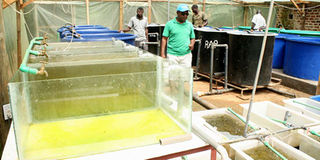Feedback: Do hormones used to reverse sex of fish affect consumers?

A fish farmer inspects hatcheries in his establishment. Male tilapia grows faster compared to females hence monosex male technology advocates for all male fingerlings to be produced so that they are cultured to reach maturity faster. FILE PHOTO | NMG
What you need to know:
- Male tilapia grows faster compared to females hence monosex male technology. The technology advocates for all male fingerlings to be produced so that they are cultured to reach maturity faster.
- The short-treatment duration and rapid metabolism of MT help ensure that tilapia is free of MT before fish reaches the consumer.
- PLCV is in the family Geminiviridae. It is not transmitted mechanically. The virus vector is the silverleaf whitefly, Bemisia tabaci.
- An acre of capsicum is projected to give you a million and the cost of production is Sh150,000. Remember that this will depend on the variety, environmental conditions, good agricultural prices and the selling price.
SEX REVERSAL IN FISH AND SAFETY OF CONSUMERS
My name is Oloo Caleb from Ugenya. I am an upcoming aquaculture farmer who is keeping Nile tilapia. I was advised to stock monosex tilapia, however, my nearest hatchery/fingerling suppliers is practising hormonal sex reversal.
I am a bit worried about the practice, will it harm the consumer?
Male tilapia grows faster compared to females hence monosex male technology. The technology advocates for all male fingerlings to be produced so that they are cultured to reach maturity faster.
There are various ways of achieving this. Hormone sex reversal is the most common practice in the country whereby hatchery practitioners use feeds containing Methyltestosterone (MT) hormone to feed the hatchlings for three to four weeks after which they obtain all male population cohort.
This is a hormone and definitely will cause uproar among the consumers. However, you should not worry about this because the hatchlings are introduced to the hormone for a period not exceeding one month.
The short-treatment duration and rapid metabolism of MT help ensure that tilapia is free of MT before fish reaches the consumer.
Digested MT is rapidly metabolised and excreted. This rapid metabolism and excretion of MT by a fish treated early in its life history, combined with the extended period needed to produce a marketable size fish results in a safe consumer product.
Alex Akidiva,
AgroScience Park Fish Farm, Egerton University
****
LEAVES OF MY PAWPAW PLANTS ARE CURLING
Instead of leaves of my pawpaw plants spreading, they are shrinking. Kindly assist on the control measures to take and the chemicals to buy as they continue growing.
Philemon
Your plants are severely infected with papaya leaf curl virus, which was first reported in Tamil Nadu in 1939. The most prominent symptoms are the rolling of the leaves downward and inward in the form of an inverted cup and the thickening of veins.
Sometimes all the leaves at the top of the plant are affected by these symptoms. In advanced stages of the disease, defoliation takes place and the growth of the plant is arrested.
PLCV is in the family Geminiviridae. It is not transmitted mechanically. The virus vector is the silverleaf whitefly, Bemisia tabaci.
As soon as the disease is noticed, the plant must be uprooted and destroyed. Avoid growing alternative hosts of the virus such as tomato and tobacco near papaya. Spray insecticides for vector control.
Peter Caleb Otieno,
Department of Crops Horticulture, and soils, Egerton University.
****
GROWING ALOE VERA
I’m interested in aloe vera farming in Lamu County. I would like to know the best variety (high-yielding), land preparation, plant management all through to harvesting and processing.
Mohamud Hassan
The species that do well in Kenya are Aloe vera bardadensis and Aloe chinensis. You can grow aloe vera from seedlings which can be obtained from Kalro.
The seedlings are planted at a spacing of 3ft by 3ft. Remember that aloe vera does not do well in cold climates, preferably in sandy soils and requires little water since the plant is succulent.
The crop requires minimal fertilisers, mulching and is not affected by diseases. The crop matures 18-24 months after planting.
You can harvest aloe leaves two times in a year by picking at least six leaves from each plant. Weeding is done during harvesting.
The leaves are cut into small pieces and then sun dried for three days, then dried under shade for six months before being milled.
Paul Maina, an aloe farmer in Nyeri, makes aloe guard detox capsules and aloe bitter sap. The flowers are kept in a shade for four months to dry after which they are milled with a machine into a powder.
The powder is then used to make soap and skin care products and to blend tea. You can also sell your aloe vera to Herbal Garden Company in Nairobi and others that use aloe vera to make their products.
Carol Mutua,
Department of Crops, Horticulture and Soils, Egerton University.
****
WHAT YOU CAN EARN FROM CAPSICUM, ONIONS AND CABBAGES
We the youth have realised the importance of earning from the soil. I would like to do an acre of capsicum, onions and cabbages. Please guide me on the costing from production to maturity. I will opt to use furrow irrigation.
Clarence Selim.
An acre of onions can give you a profit of Sh 354,000. The expenses add up to Sh125,000 from nursery production to harvesting.
An acre of cabbage will give you a net profit of Sh210,863 after deducting the expenses, which add up to Sh79,137.
An acre of capsicum is projected to give you a million and the cost of production is Sh150,000. Remember that this will depend on the variety, environmental conditions, good agricultural prices and the selling price.
Carol Mutua,
Department of Crops, Horticulture, and Soils, Egerton University.
****
A FAMILY FRIEND GRABBED MY FATHER’S AGRICULTURAL LAND
My father had a piece of land which was registered in his name in 1974. He died in 2002 before sub-dividing the land for us since by then we were minors.
A family friend requested for a portion of the land to build his home through my mother in 2003 and he was given, but since he had money, he influenced the land register to transfer the land first to my mother’s name before sub-dividing in 2003.
In 2004, the tittle deed was issued in my mother’s name and in a month’s time sub-division was done. In 2013, I went to the land office to do a search and I found that the land which was 3.2ha had been sub divided equally.
I went further and requested for the green card and realised it says succession was done in 2003 without case number and the court in which it was done.
Can we do succession to revoke other transactions or do we file a civil suit to reclaim the land back to my father’s name and do succession?
Daniel Juma
It is very possible to repossess your father’s agricultural land. The following are the reasons;
1) You were a minor by the time the succession was done therefore, you were not consulted. However, you are now adults, therefore, your consent is necessary and you have full right to lodge your case in court.
2) If the green card indicates that in 2003 succession was done, and there is neither case number nor the court in which it was done, then it means it is a fraudulent issue, of which the people whose names appear have a case to answer in court.
3) In a case of land succession after the death of the person who owns the parcel number, there must always be a meeting from the family/relatives or close neighbours to deliberate on the matter. The minutes of the deliberations are then taken to the court. The sons of the deceased must lodge a case that their father died before succession and they want to start the process, and the court will grant the wish via a Kenya gazette notice. Because this was not done, therefore, your father’s land is not yet lost.
4) When the court of law grants you authority to do the succession process, it will be put in Kenya gazette with your father’s name, which must appear for every Kenyan to see. This is also not there, so your father’s land is not lost.
5) The copy of the gazzeted land must be taken to land board in your area, which assign a surveyor to come to your land with armed administration police to survey it and divide it equally the way you want it to be.
That is what is termed as succession. Finally, I must tell you that your father’s land is safe and those grabbers will not succeed in taking it.
Only that you need to move with speed in processing as follows;
1) Take the search to the court and get advice.
2) Hold family meeting to deliberate on how land will be divided among you
3) Take minutes to court with your father’s death certificate.
4) Lodge a case with the forms you fill there and with consent from your assistant chief.
5) You will be booked in the court when to attend for your case.
6) The rest will flow from there to the end of the succession process. I have done it before, to be specific in 2006 and your case is similar to mine.
Remember the law of land in Kenya has not changed. I wish you success.
Peter Caleb Otieno,
Department of Crops Horticulture and soils, Egerton University





